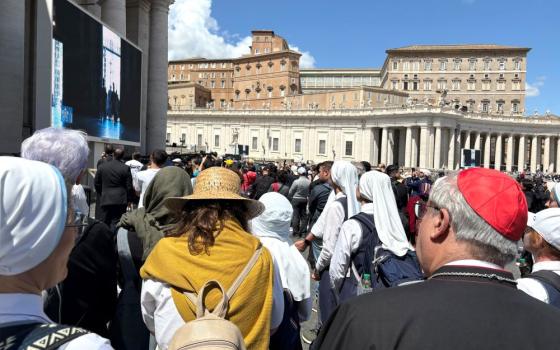It is time for Archbishop John Nienstedt to go.
Reading the affidavit of Jennifer Haselberger, the former chancellor of the Archdiocese of St. Paul, is grim. Caveat: A lawyer friend told me that a good defense attorney could drive several trucks through the document and that may be true. But, even if a quarter of what is asserted in that document is true, it is obvious that the Archdiocese of St. Paul has failed to live up to the bishops’ own requirements regarding the protection of children. Instances of suspected child abuse were not reported to the civil authorities. Clergy were not removed from active ministry as required by the Dallas Charter for the Protection of Children. Almost every page of Haselberger’s affidavit illustrates a clerical culture that, when confronted with evidence of proven or potential sexual abuse of a minor, instinctively reacted with the thought, “poor Father.”
Archbishop Nienstedt is not the first bishop to be found ignoring or ameliorating the bishops’ own guidelines for child protection. The grand jury reports from Philadelphia showed a similar willful disregard for the Dallas norms. We all know that Bishop Robert Finn of Kansas City-St. Joseph remains the bishop of that diocese even though he could not be hired to teach Sunday school because of his prior conviction for failing to report suspected child abuse. Each of these cases damages the credibility of the entire episcopacy. Each of these cases evidences a lack of accountability. Each of these cases gives the lie to the claim, repeated again and again since Dallas, that the bishops have cleaned up the mess, that the Catholic Church is now the safest place in the world for children, that the whole sordid clergy sex abuse mess is in the rear view mirror.
It is important to draw a distinction here. There is no excusing what happened before Dallas, the systematic re-assignment of predators, the cover-ups, the failure to abide by civil law to say nothing of the moral law. But, at Dallas, the bishops of the United States recognized the problems were systemic and adopted a systematic approach to those problems, a nationwide set of standards that they applied to themselves, and establishing a system of audits to assure compliance. There really are no excuses now. One of the most damning parts of the Haselberger affidavit is the section that shows how easily the authorities in St. Paul misrepresented their compliance with the Dallas Charter.
It is also important to draw a distinction between the charges leveled against Archbishop Nienstedt. There are essentially two sets of charges, first that he failed in his responsibility to abide by the Dallas Charter and, second, that he himself has engaged in inappropriate sexual behavior. I do not really care if +Nienstedt made inappropriate adcances with adults, although the charge that those adults included seminarians and clergy raises the possibility of exploitation and creating a hostile work environment, to be sure. Those charges matter for a reason, which I will get to in a minute, but the principal charge, the charge on which the credibility of the entire hierarchy is now resting, is the degree to which the Dallas Charter was violated. That Charter was the promise the bishops as a whole made to the Church. That Charter was understood to be sufficiently rigorous to justify erecting, in our minds, a dividing line between pre-Dallas and post-Dallas, and hoping that the scourge of clergy sex abuse of minors was being rooted out. If +Nienstedt – or any other bishop – is shown to have violated the Charter, they should go.
The charge of inappropriate sexual activity with adults matters for a different reason. Reading the Haselberger affidavit, and the depositions of others in leadership in the St. Paul chancery, a portrait of +Nienstedt emerges. Whatever his intentions, those who worked most closely with him experienced him as aloof at best, deeply conflicted at worst. It is impossible to lead an organization if frank communication and conversation is unwelcome. In vetting candidates for the episcopacy, it is vital that the nuncio and the Congregation for Bishops seek out candidates who invite frankness, who are not aloof, who are not condescending. Recently, I was discussing one such candidate with a bishop and I remarked that I had only met the priest once but found him very condescending to me. The bishop said that he had met the man and not found him to be so. “Well, he wouldn’t be to you, would he?” I replied. I do not know the degree to which inquiries are made when vetting candidates, but it must include someone outside the closed world of chancery personnel, someone who might have been in a position to see a candidate’s true colors, to be able to let the nuncio know that however charming a given candidate might be within the clerical culture, they wear a different face to the people they will be expected to serve and to lead. We need more candidates with real flesh-and-blood pastoral experience with people and fewer seminary rectors and former Vatican staffers in the ranks of the hierarchy.
Aloof is bad enough. Conflicted is more disturbing. You did not need to wait to read the Haselberger affidavit to know that something about +Nienstedt was a little off. In February 2006, while still serving as the Bishop of New Ulm, +Nienstedt took exception to the movie “Brokeback Mountain.” He raised his objection in the pages of his diocesan newspaper, in which he gave a brief synopsis of the movie’s plot, including these sentences: “The story is about two lonely cowboys herding sheep up on a mountain range. One night after a drinking binge, one man makes a pass at the other and within seconds the latter mounts the former in an act of wanton anal sex.” Now, I do not know about New Ulm, but here in the Archdiocese of Washington, I think I may be the only person under sixty who reads our diocesan newspaper. Did little old pious gentlemen and ladies in New Ulm really need to encounter the phrase “wanton anal sex” on a cold Sunday morning in 2006? Surely, that phrase was not included for the benefit of the readers.
Why, then, was it included? I am not a shrink. Indeed, I am not even very good at reading other people’s emotions. But, even a modicum of common sense should’ve tipped off anyone thinking of promoting +Nienstedt to St. Paul that such explicitness in the forum of a diocesan newspaper evidenced a lack of propriety, of boundaries, on the issue of homosexuality. And, again stipulating that I am no psychiatrist, in my experience, people tend to get such boundaries wrong when they are themselves conflicted, especially when the issue is sex. Perhaps, no one at the Congregation for Bishops noticed or cared about +Nienstedt’s essay on “Brokeback Mountain.” Perhaps, too, so many clergy and so many bishops have experienced so many conflicted personalities he just blended in, the alarm bells did not go off, he had a powerful patron, the promotion was made. And, when Archbishop Nienstedt became the face of opposition to same-sex marriage, launching an expensive campaign and seemingly discussing nothing else for several months, how many people and how many clergy in St. Paul looked at him, then looked at each other, and murmured “Me thinks the lady doth protest too much.” I heard it then, and since, and I have never been to Minnesota!
My heart goes out to anyone who is deeply conflicted about sex or anything else. (And, all of us have, or should have, some degree of conflict on such personal issues to be sure.) But, when a conflicted person visits his conflictedness on the people of God, those same people can be forgiven for questioning the moral authority of their bishop. One of the saddest things about this whole mess in St. Paul is the realization that virtually no one has expressed any love for their bishop. The depositions and the affidavits paint the picture of a person removed from normal human interactions. Whether he abided by the Charter or not, whether he had inappropriate sexual relations with adults or not, how did this man become a bishop? And, while I worry about mob justice, and the prospect of trial lawyers focusing on bishops they do not like and trying to pull them down, I worry more that unless and until we select bishops who are not so obviously conflicted, men who have not only the smell of the sheep but an evident love for the company of the sheep, and a willingness to speak and be spoken to with candor and frankness, in short, men who are healthy as well as holy, we risk more crises like the one engulfing St. Paul today. In any event, it is time for +Nienstedt to spare the good people of St. Paul further anxiousness, submit his resignation, and hope that a new bishop can come in, make a fresh start, and prove himself capable of leading his flock into a less troubled future. It is time for him to go.



